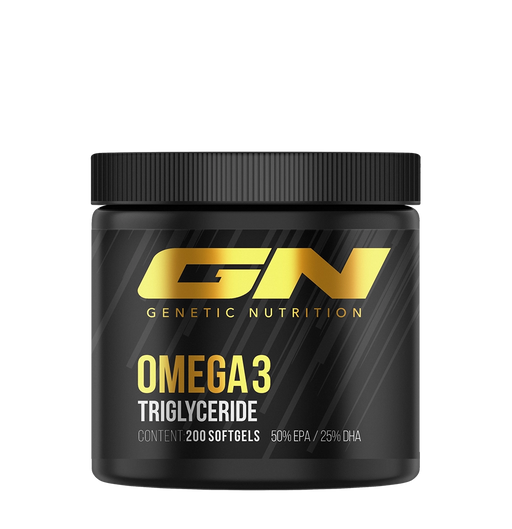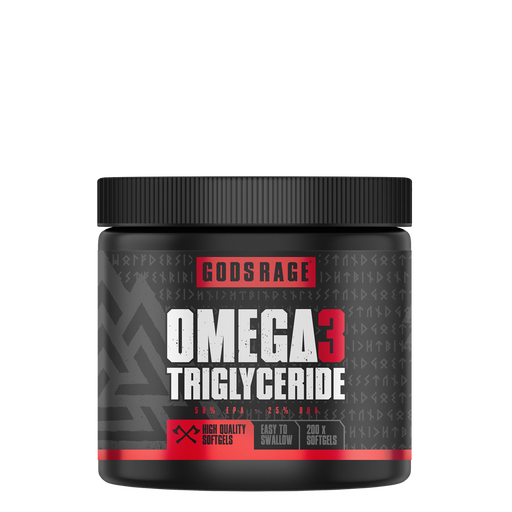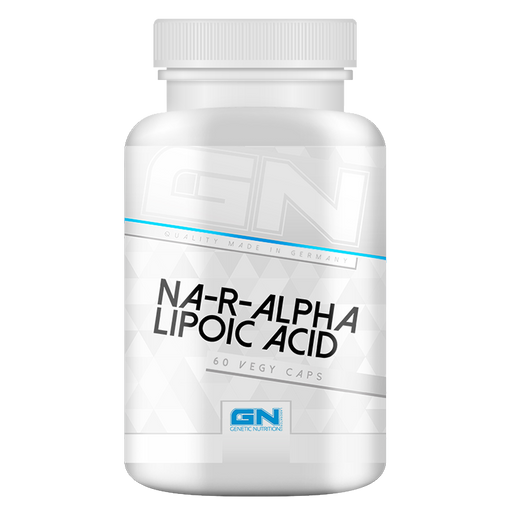Essential fatty acids
Filters
-
 Save 0%
Save %
Original price €34,90 - Original price €34,90Original price €34,90€34,90€34,90 - €34,90Current price €34,90| /
Save 0%
Save %
Original price €34,90 - Original price €34,90Original price €34,90€34,90€34,90 - €34,90Current price €34,90| /Triglyceride Omega 3 Sport Edition · 200 softgels
GN Laboratories149 reviewsOmega-3 fatty acids are one of the supplements that are mentioned first when it comes to determining the most important dietary supplements. Once y...
View full detailsOriginal price €34,90 - Original price €34,90Original price €34,90€34,90€34,90 - €34,90Current price €34,90| /Save 0% Save % -
 Sold out
Original price €34,90 - Original price €34,90Original price €34,90€34,90€34,90 - €34,90Current price €34,90| /
Sold out
Original price €34,90 - Original price €34,90Original price €34,90€34,90€34,90 - €34,90Current price €34,90| /Omega 3 Triglycerides · 200 Softgels
Gods Rage63 reviewsOmega-3 fatty acids have numerous benefits for your health. They have a positive effect on the heart, brain and eyesight, helping your body to func...
View full detailsOriginal price €34,90 - Original price €34,90Original price €34,90€34,90€34,90 - €34,90Current price €34,90| /Sold out -
 Save 78%
Save %
Original price €27,90Original price €27,90 - Original price €27,90Original price €27,90Current price €6,20€6,20 - €6,20Current price €6,20| /
Save 78%
Save %
Original price €27,90Original price €27,90 - Original price €27,90Original price €27,90Current price €6,20€6,20 - €6,20Current price €6,20| /NA-R-Alpha Lipoic Acid · 60 capsules
GN Laboratories9 reviewsAlpha lipoic acid in its most potent form for antioxidant protection, increased energy, faster post-workout recovery, healthy blood sugar levels an...
View full detailsOriginal price €27,90Original price €27,90 - Original price €27,90Original price €27,90Current price €6,20€6,20 - €6,20Current price €6,20| /Save 78% Save %
As most readers probably know, dietary fat intake is an important part of a fitness-oriented lifestyle and essential for overall health. Fats can be divided into two groups: saturated and unsaturated fats. More important, however, is the distinction between essential and non-essential fats. Essential fats must be obtained from food, as the body cannot produce them itself. In this article we will answer the following questions:,
- What are essential fatty acids?
- What do essential fatty acids do?
- What happens if you do not consume sufficient amounts of essential fatty acids?
- What sources of essential fatty acids are there?
The essential fatty acids
Alpha-linolenic acid (LNA) (omega-3) can be converted into:
- Eicosapentaenoic acid (EPA) (omega-3)
- Docosahexaenoic acid (DHA) (omega-3)
Linoleic acid (LA) (omega-6) can be converted into
- Gamma Linoleic Acid (GLA) (Omega-6)
- Dihomogamma linoleic acid (DGLA) (omega-6)
- Arachidonic acid (AA) (omega-6)
What do essential fatty acids do and what are they needed for?
- Energy production
- Distribution of oxygen in the bloodstream
- Hemoglobin production
- Vital for the transport and metabolism of triglycerides and cholesterol
- Development of brain and nerve tissue
- Control of cell membrane fluids
- Reduction of blood cholesterol and blood lipid levels
- Stabilization of insulin and blood sugar levels#
- Treatment of arthritis
- Anti-inflammatory effect
- Helpful for inflammatory diseases
- Relief for asthma
- Reduction of PMS symptoms
- Reduction of allergic reactions
- Strengthening the immune system
- Reduction of water retention by supporting sodium and water excretion
- Support for a smooth skin texture
- Relief of psoriasis
- Calming effect and regulation of mood (2)
Essential fatty acids are undoubtedly extremely important, but there are even more interesting properties.
Prostaglandins
Alpha-linolenic acid and linoleic acid are metabolized into eicosanoids. Eicosanoids can be further subdivided into leukotrienes, prostaglandins and thromboxanes. For the purposes of this article, however, we will only deal with prostaglandins.
Prostaglandins are hormone-like chemicals that regulate cellular activities. Prostaglandins are categorized into one of three groups depending on the fatty acids from which they are metabolized. These groups are series 1 prostaglandins, series 2 prostaglandins and series 3 prostaglandins.
Series 1 prostaglandins
Series 1 prostaglandins are formed from gamma linoleic acid (GLA). Series 1 prostaglandins are also known as "good" prostaglandins due to their ability to improve blood flow, lower blood pressure and reduce inflammation, among other cellular functions (3). Perhaps the most important effect is the prevention of the release of arachidonic acid by the cells. The reason this is so important is that series 2 prostaglandins are formed from arachidonic acid.
The following are some of the main reasons why series 1 prostaglandins are so important for bodybuilders and health-conscious people:
- Increased synthesis of muscle cell protein
- Increased insulin sensitivity (this means that less insulin is needed to deliver glucose to the body's cells)
- Increase in the release of growth hormone (4)
Series 2 prostaglandins
Series 2 prostaglandins are also known as "bad" prostaglandins. As already mentioned, series 2 prostaglandins are formed from arachidonic acid. These prostaglandins promote sodium retention, inflammation and the formation of blood clots (3). Series 2 prostaglandins also increase the release of cortisol - a highly catabolic hormone. Anyone interested in building muscle does not want this to happen.
Series 3 prostaglandins
Series 3 prostaglandins are formed from EPA (which in turn is formed from alpha-linolenic acid). Series 3 prostaglandins are "good" prostaglandins because they prevent the formation of series 2 prostaglandins.
However, series 2 prostaglandins are not bad through and through. They are needed to ensure adequate testosterone levels. I wouldn't worry about this though. The body is constantly working to keep everything in balance. Trying to get too technical and supply the exact amounts of fats needed to get the best of both worlds is impossible. As long as you get the essential fatty acids you need, you shouldn't worry too much about it.
Consequences of a lack of essential fatty acids
Possible consequences of a linoleic acid deficiency:
- Eczema-like skin eruptions
- hair loss
- Degeneration of the liver
- Behavioral disorders
- Degeneration of the kidneys
- Excessive sweating accompanied by thirst
- Dehydration of the glands
- Susceptibility to infections
- Poor wound healing
- Infertility in men
- Miscarriages in women
- Arthritis-like diseases
- Cardiovascular problems
- Growth disorders (1)
Possible consequences of an alpha-linolenic acid deficiency:
- Growth disorders
- weakness
- Impaired vision and learning ability
- Disorders of motor coordination
- Tingling sensations in arms and legs
- Changes in behavior (1)
How much should you eat?
We can see how important essential fatty acids are, but how much do you need? The general recommended ratio of linoleic acid to alpha-linolenic acid is 4:1 or 3:1. The reason for this ratio is that alpha-linolenic acid is metabolized four times faster than linoleic acid. For every gram of alpha-linolenic acid, you should therefore consume three to four grams of linoleic acid. The diet often contains plenty of linoleic acid but very little alpha-linolenic acid. There is currently no official recommended amount for essential fatty acids.
Choosing the "right" supplement
If you start looking for supplements, oils or foods that contain essential fatty acids, you will find that most contain more alpha-linolenic acid than linoleic acid. You probably remember that the ratio of linoleic acid to alpha-linolenic acid should be 3-4:1. However, this is no cause for concern as, as mentioned above, you already get a good amount of linoleic acid in your daily diet. However, as you need more alpha-linolenic acid in your diet, most supplements contain more alpha-linolenic acid than linoleic acid.
Capsules or oil
One of the first things people look at when buying something is the price. It is far more economical to buy an oil like linseed oil instead of capsules. You get more essential fatty acids this way. However, the taste of the oil can also be a deciding factor. I personally like the taste of linseed oil, whereas other people would like to throw up just thinking about it. If you don't like the taste of essential fatty acids, you should probably opt for capsules.
Capsules are much more convenient. You simply pop a few into your mouth and wash them down with water. You can also easily take the capsules with you wherever you go. When deciding whether to use capsules or oil, you have to weigh up the amount of money you can or want to spend, the need for convenience and your personal taste preferences. It's important to remember that you can also get all the essential fatty acids you need from food. Here is a short list of some foods that contain essential fatty acids:
Where to find them
Omega 3:
- Salmon
- Tuna
- trout
- walnuts
- linseed
- Pumpkin seeds
- Linseed oil
- Hemp seed oil
- Soybean oil
Omega 6:
- Corn oil
- Soybean oil
- Sunflower oil
- safflower oil
- walnuts
- Pumpkin seeds
You can sprinkle flaxseed over your breakfast cereal or salad, eat fish or take a handful of walnuts to meet your essential fatty acid needs. You should choose what is best for you. The most important thing is to consume these essential fatty acids and live a healthy life.



